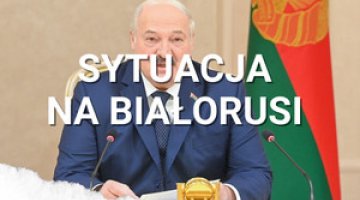Belarus's diplomatic war with the European Union
On 28 February, the Belarusian government demanded that the ambassadors of the EU and Poland in Minsk leave the country, and recalled the heads of its institutions in the European Union and Warsaw for consultation. This was a reaction to the EU Council’s decision the previous day to expand the list of representatives of the Belarusian regime who are subject to visa and financial sanctions by a further 21 individuals responsible for human rights violations. In response to Belarus’s action, the EU decided on the same day to appeal for all the ambassadors of EU member states in Minsk to withdraw for consultation.
Belarus has deliberately sought confrontation in order to demonstrate its hardline stance towards the West. By ratcheting up the tension with the EU, Minsk is hoping to reinforce the divisions between those member states which are primarily interested in developing economic cooperation with Belarus, and those that advocate taking a firm stance on Minsk’s human rights violations. Belarus’s decision was also intended for internal purposes, and its aim was to consolidate both the ruling camp and the general public.
The EU’s sanctions
The EU Council has decided to extend the list of persons subject to sanctions because of the Belarusian regime’s increasing repression of society. The list of currently added persons includes judges and high-ranking police officer responsible for the persecution of the opposition. However, because of opposition from Slovenia, the Council decided not to introduce economic sanctions against the Triple holding companies, or their owner Yuri Chyzh, which are the business backbone of Alyaksandr Lukashenka’s regime. Slovenia's veto of further economic sanctions (Latvia also voiced its concerns on the matter) is the result of short-term economic interests; the Slovenian company Riko is to build a hotel complex in Minsk worth €100 million jointly with Triple, a project which will be partially funded by the Slovenian bank NLB. Belarus is of no political importance for many EU countries, who see it through the prism of their own economic interests; this has led to a lack of enthusiasm for introducing economic sanctions.
The EU’s policy towards Belarus
The EU is taking an increasingly principled stance of demanding that the government in Minsk cease its repression of the population, and release and rehabilitate political prisoners. Due to the deteriorating human rights situation in Belarus, the EU has gradually tightened sanctions against those representatives of the regime who have been responsible for the repression (more than 220 names are now on the list), as well as those companies and individuals which support the regime. On 10 February, the Council expanded its criteria for imposing sanctions on individuals and legal entities. At the same time, the EU has raised the issue of human rights violations in Belarus in international institutions, and is trying to develop its cooperation with civil society and the democratic opposition. This was one of the reasons behind the visit to Minsk (8-10 February) by the EEAS’s representative Gunnar Wiegand, who met opposition representatives as part of the ‘European dialogue on modernising Belarus’. Despite the EU’s critical position, he also worked to maintain contacts with the Belarusian government (for example, Wiegand met the head of the Belarusian Foreign Ministry), while emphasising that it is ready to provide broad economic support once the Belarusian government undertakes political reforms.
Minsk’s policy of confrontation
Belarus’s decision to withdraw its ambassadors from Brussels and Warsaw, and the recommendation that the heads of the EU and the Polish embassies leave Belarus, was preceded by a series of hostile actions by the Belarusian government towards the West. In mid-February, the Belarusian Deputy Prime Minister Syarhey Rumas appealed to Russia and Kazakhstan (countries that are part of the Common Economic Space with Belarus) to take a position on the EU/US sanctions against Belarus. On 20 February, President Lukashenka harshly criticised the EU’s policy and threatened that if they continue to expand sanctions, Belarus would respond with full force, and did not rule out blocking the transit of goods to Western customers. On 24 February the presidents of Russia and Belarus released a joint statement which condemned the policy of sanctions by the US and the EU, and also called for dialogue.
Everything indicates that Lukashenka has intentionally worsened his country’s already strained relationship with the West. Fearing the weakening of his power, the Belarusian president is not ready to meet the West’s expectations, and has demonstrated that any dialogue will only be possible on his terms (economic cooperation and the acceptance of his authoritarian political regime). At the same time, it seems that Minsk is using the issue of sanctions from the EU and US in its relations with Russia, which it will attempt to obtain additional financial and political support from in exchange for its loyalty and an anti-Western foreign policy. Meanwhile, the demand to withdraw the Polish ambassador from Minsk is a signal that those states actively striving for stricter sanctions against the regime should expect a particularly strong reaction from it. In this way, the Belarusian government is trying to divide the EU member states, some of whose decisions with regard to Belarus are primarily guided by economic interests. Minsk’s aggressive policy towards the West also has an internal aspect. Lukashenka is showing his firmness towards both the ruling elite and the general public, and is also creating a feeling of ‘danger’ from the West as an external enemy, which will probably be used for propaganda purposes in the parliamentary elections scheduled for September.
Conclusions
- Minsk has consistently sought to confront the West, and therefore the EU Council’s decision to extend the list of people banned from entry was merely an excuse for the government of Belarus to take even more decisive action. Minsk’s main aim is to deepen the divisions among EU member states on their policy towards Belarus, and to obtain additional financial support from Russia.
- The EU’s quick and decisive response, namely its decision to recall the member states’ ambassadors from Minsk (16 EU countries have embassies there), demonstrated a principled position and showed the unanimity of the member states. In this situation it will be hard for Belarus to exploit differences between them. Nor does it seem that the Union is ready to soften its position without a gesture from the part of Belarus, such as releasing political prisoners. Given Minsk’s lack of will to meet EU expectations, it is expected that relations will remain frozen for some considerable time. Thus, Belarusian diplomacy has achieved the opposite effect to that intended; it has (at least temporarily) consolidated the EU’s position, which in turn will facilitate the further tightening of sanctions against the regime.
- Further escalation of hostile action towards the West by Minsk is likely. All indications are that the main target of the regime’s attacks will be Poland, which is being built up as the key external enemy. Therefore, further anti-Polish propaganda in the state media, the expulsion of diplomats, and illegal repression against the Union of Poles in Belarus are possible.
- Minsk’s measures against the EU once again point to a deep, systemic crisis in the regime of Alyaksandr Lukashenka. The Belarusian government remains unable to conduct an adequate and effective policy towards the West, and is limited to attempts to delay the introduction of further sanctions by targeting selected EU member states and offering them business benefits in return. On the other hand, trade with the EU is very important for the Belarusian economy, which could be a factor in limiting Minsk’s more aggressive activities. According to Belarusian data, in 2011 Belarusian exports to EU countries surged from US$7.6 billion to US$15.7 billion (US$10.4 billion of which were oil products). In bilateral trade, Belarus showed a surplus of €7 billion (the EU accounted for 39% of exports and 19% of imports in Belarus, and Russia 34% of exports and 54.5% of imports). This has allowed a reduction of the significant deficit in total Belarusian foreign trade, which has helped the government in Minsk to bring the serious financial crisis under control and avoid a collapse of the balance of payments in 2011.
- The breakdown of relations with the EU will deepen Belarus’s dependence on Russia, which will be Minsk’s only real creditor, energy supplier and investor. In the long term, limiting its foreign policy to relations with Russia alone could lead to a further loss of independence for Belarus.





